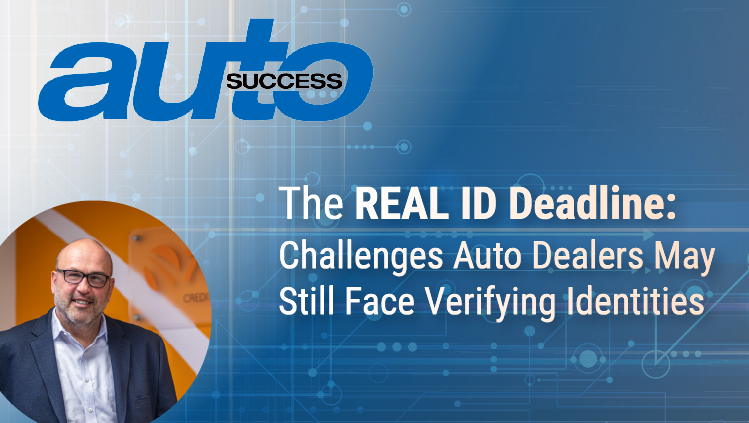
This article was originally published by Automotive News and is featured in their September 2020 issue.

Author: Jackie CharnigaTransUnion says the pandemic may have contributed to a slowdown in such thefts, but it suspects such scams will surge when forbearance programs scammers are now turning their attention to come to an end.
Synthetic identity theft, where scam artists cobble together an identity by blending real and fake information to obtain vehicles, has slowed somewhat during the coronavirus pandemic, credit bureau TransUnion says.
Forbearance programs may be the main reason for the decline in synthetic identities being used in auto loan applications. The programs assist consumers impacted by COVID-19 but also allow opportunities for scammers to establish an auto account and immediately request payment relief from their lender. The bureau suspects synthetic identity theft likely will rise with a vengeance once the U.S. exits a state of emergency and these relief periods expire.
Pre-COVID-19, synthetic identity fraud made up the bulk of auto fraud, Doug Clare, vice president, fraud, compliance and security solutions at Fair Isaac Corp., told Automotive News.
“It’s still hard to tell where you have credit-loss problems and where you have real fraud,” he said. “When payments have been deferred … it’s going to be hard to determine your fraud problem.”
These scammers spend time building an identity with credit bureaus by using an acquired name and address. Next, they establish a credit history, usually by attaching their fake identity as an authorized user to another person’s credit card. The fake identity builds credit as the owner of the card makes payments.
“They’re very patient,” Clare said. “They’ll build that file, and in one to two years, they have what they call a ‘bust-up’ where they utilize those credit lines and walk away with anything purchased on that credit line.”
After years of double-digit growth of synthetic identity fraud in auto lending, it leveled off in2019, TransUnion said. Among the likely reasons were lenders adopting synthetic-identity detection technology, an uptick in the use of artificial intelligence in loan decisioning and data- sharing among lenders.
The incidence rate of suspected synthetic identities in auto tradelines reported in the second quarter was 50 percent lower than in the same quarter last year and 62 percent lower than in2018, according to TransUnion.
Ken Hill, managing director of 700Credit, a supplier of credit and compliance solutions to dealerships, said more stores are signing up for its synthetic fraud identification tool.
“Somebody — through dumpster diving or through a data breach — is going to try to come in and purchase a car with someone else’s identity,” Hill said. “Our Red Flag products that we utilize today provide dealers a way to verify the identification of that person that’s sitting in front of them.”
Each customer’s driver’s license is scanned by the tool to ensure it hasn’t been tampered with. The address on the license must match the one listed on the credit application, Hill said. The system also generates questions based on information in the person’s credit profile that dealership employees can ask to further validate a customer’s identity.
This article was originally published by Automotive news and can be found here: autonews.com/finance-insurance/synthetic-id-fraud-slowing-credit-bureau-says


